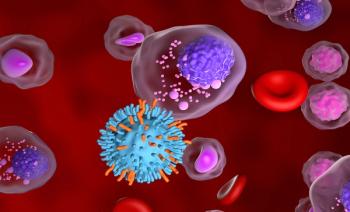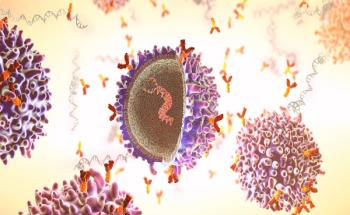
Clinical
Latest News
Latest Videos

CME Content
More News

This new analysis examined the investigational chimeric antigen receptor (CAR) T-cell therapy GC012F among patients with newly diagnosed and high-risk multiple myeloma (MM).

Patients diagnoesd with metabolic dysfunction–associated steatotic liver disease may have a higher risk of colorectal cancer (CRC) or colorectal adenoma.

New Jersey Governor Phil Murphy joined BeiGene CEO John Oyler and about 300 guests to open the facility, located in Hopewell, New Jersey. A version of this article appeared in the August issue of Evidence-Based Oncology.

Ryan Jacobs, MD, lymphoma division director at Atrium Health Levine Cancer Institute, explains the design and objectives of the phase 2 CAPTIVATE study comparing ibrutinib and venetoclax in patients with chronic lymphocytic leukemia (CLL).

Diane Mahoney, PhD, DNP, FNP-BC, WHNP-BC, APRN, discusses her study on how social determinants of health impact the health perceptions of Black and Hispanic ovarian cancer survivors, highlighting significant health disparities.

The social determinants of health (SDOH) that need to be tackled most urgently when it comes to which patients with large B-cell lymphoma (LBCL) do and do not receive chimeric antigen receptor T-cell therapy (CAR T) are age, sex, income, and race/ethnicity.

Patients with intellectual disabilities experience inconsistent chronic obstructive pulmonary disease (COPD) consultations and higher rates of antibiotic prescriptions for asthma, highlighting the need for improved and tailored primary care management.

This new study evaluates the efficacy of monotherapies and venetoclax combination therapies in different T-cell acute lymphoblastic leukemia (ALL) cell lines.

Although the amount of real-world evidence demonstrating the safety and efficacy of immune checkpoint inhibitors in advanced hepatocellular carcinoma (HCC) has been growing, data on liver function evolution as a prognostic factor for overall survival are lacking.

Beremagene geperpavec-svdt (B-VEC) entered the market in 2023 as the first approved corrective treatment for dystrophic epidermolysis bullosa (DEB), a rare genetic disease affecting the skin and nails that is caused by mutations in the COL7A1 gene.

The findings show most patients with low-risk myelodysplastic syndrome (MDS) will die before progression.

Patients with atrial fibrillation who use wearable devices, like Apple Watches and FitBits, report higher anxiety levels and increased health care usage than nonusers.

Patients with atopic dermatitis who use oral corticosteroids for more than 90 days have a slightly increased risk of adverse events like myocardial infarction and hyperlipidemia.

A leading oncologist explores promising new breast cancer therapies in the drug development pipeline and advises healthcare providers on strategies to remain informed about the most current treatment guidelines and recommendations.

An oncologist specializing in breast cancer treatment reviews the latest guideline recommendations for systemic therapies in HR+/HER2- breast cancer, comparing the available CDK4/6 inhibitors and discussing considerations for optimal treatment sequencing.

The effectiveness of nirsevimab therapy shows promise against respiratory syncytial virus (RSV)–associated bronchiolitis in a real-world setting.

Chronic obstructive pulmonary disease (COPD) significantly heightens the risk of mortality and hospitalization in patients with heart failure with preserved ejection fraction (HFpEF).

On this episode of Managed Care Cast, we're talking with the author of a study published in the July 2024 issue of The American Journal of Managed Care® that estimates the insurance value of novel Duchenne muscular dystrophy (DMD) treatment.

Social determinants of health (SDOH) factors significantly impact the overall health perceptions of Black and Hispanic ovarian cancer survivors.

Key discussion points for educating patients on infection risk management in PNH care are highlighted.

Medical experts navigate significant challenges associated with PNH treatment.

Investigators hoped to use large-scale proteomics to help predict hypertensive disorders of pregnancy (HDP), using blood proteins obtained from individuals in their first trimester of pregnancy—but success has been elusive.

The therapy led to increased frataxin levels and decreased left ventricular mass in patients with Friedreich ataxia (FA) cardiomyopathy, the authors said.

Atopic dermatitis experts examine factors that impact coverage decisions for atopic dermatitis (AD) treatments, address challenges providers encounter (such as step-therapy and prior authorization) and offer strategies to streamline the prior authorization process for topical AD therapies.

Using the modified Tinkertoy Test (m-TTT), recent findings further the understanding of specific cognitive deficits affecting life skills in individuals with schizophrenia, revealing a critical link between divergent thinking and daily functioning.
















